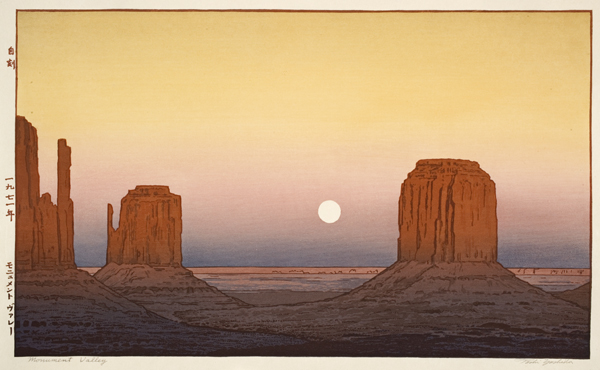
Landscape Prints by Yoshida Tōshi (1911-95)
Above: Yoshida Tōshi, Monument Valley, 1971, self-carved woodblock print, ink and color on paper; Gift from the Judith and Paul A. Falcigno Collection, 2010.105
June 5 – November 10, 2013
An installation in the Japanese Gallery honors and acknowledges a generous gift from Judith and Paul A. Falcigno of prints by the 20th-century Japanese artist Yoshida Tōshi (1911-95). The selected works exemplify Tōshi’s successful development of the Yoshida family tradition of depicting landscapes. To appeal to Western collectors Tōshi depicted seasonal views of famous places in Japan as well as of celebrated sites in foreign countries, including the U.S., which the artist visited on his many trips. The print illustrated here, for example, depicts Monument Valley, Utah, in moonlight. Many of Tōshi’s later landscapes focus on the animals and places that inspired him the most (i.e., wild animals in Africa).
Related Event
Gallery Talk: Yoshida Tōshi (1911-95)—Surmounting the Odds for the Good of Man
Thursday, June 13, 2013, 5:30
Louise Virgin, Curator of Asian Art
Japanese Gallery
Free with Museum admission
The Japanese artist Yoshida Tōshi survived polio and training under his demanding father, Yoshida Hiroshi (1876-1950), to become the innovative head of the famous Yoshida Family Studio. Loyal to his family legacy, Tōshi designed landscape prints of scenic places in Japan, as well as in other Asian and Western countries (including the U.S.). Later he also enjoyed creating abstract works as well as scenes of African wildlife. This gallery talk will explore how Tōshi's life experiences and quiet dictum, “Do not look upward, do not look down. But develop more inside,” contributed to his outgoing personality. It also imbued his woodblock prints, paintings and illustrations in an animal picture book series for children, with an understated, harmonious grandeur.

 Sign up for WAM eNews
Sign up for WAM eNews